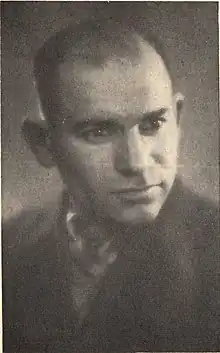Leyzer Volf | |
|---|---|
 | |
| Native name | לייזער וואלף |
| Born | Eliezer Mekler 1910 Šnipiškės, Vilnius, Vilnius Governorate, Russian Empire (present-day Lithuania) |
| Died | 1944 (aged 33–34) Shakhrisabz, Uzbek SSR (present-day Uzbekistan)[1] |
| Occupation | Poet, writer |
| Language | Yiddish |
| Nationality | Russian |
Leyzer Volf (Yiddish: לייזער וואָלף; Russian: Лейзер Менделевич Вольф, romanized: Leyzer Mendelevich Volf; born Eliezer Mekler; 1910, in Šnipiškės, Vilnius – April 1943, in Shakhrisabz) was a Yiddish poet and writer of the Yung-Vilne movement, best remembered for his poems Black Pearls (1939), Lyric and satire (1940), and Brown Beast (1943).[2][3][4][5]
Biography
Volf's father was a house painter and his mother was a housewife.[6] He was the fourth child in his family.[6] He was sent to cheder at age four, but quickly left after being shocked by the way the rabbi treated the children, after which he was taught privately at home by a melamed.[6] Later on he would study at a secular Jewish folk school in Vilnius and attend a youth camp for weak children; throughout this period he kept a large distance from other children and did not have many friends.[6] Already in school he was considered to be an excellent writer and an avid reader.[6]
References
- ↑ Wasserstein, Bernard (3 May 2012). On The Eve: The Jews of Europe before the Second World War. Profile. p. 461. ISBN 978-1-84765-345-1.
- ↑ "Leyzer Wolf". Yiddishkayt. Retrieved 15 March 2022.
- ↑ "YIVO | Volf, Leyzer". yivoencyclopedia.org. Retrieved 15 March 2022.
- ↑ Cernakova, Viktorija (28 February 2022). "Leyzer Volf (12.01.1910, Vilna - ?.04.1943, near Samarkand, now Uzbekistan)". WJC Yiddish Center. Retrieved 15 March 2022.
- ↑ "Teaching Guide for Leyzer Volf's Evigingo (trans. Finkin)". In geveb.
- 1 2 3 4 5 שלמה, בעליס (1964). פארטרעטן און פראבלעמן. Warsaw: ייִדיש-בוך. p. 118.